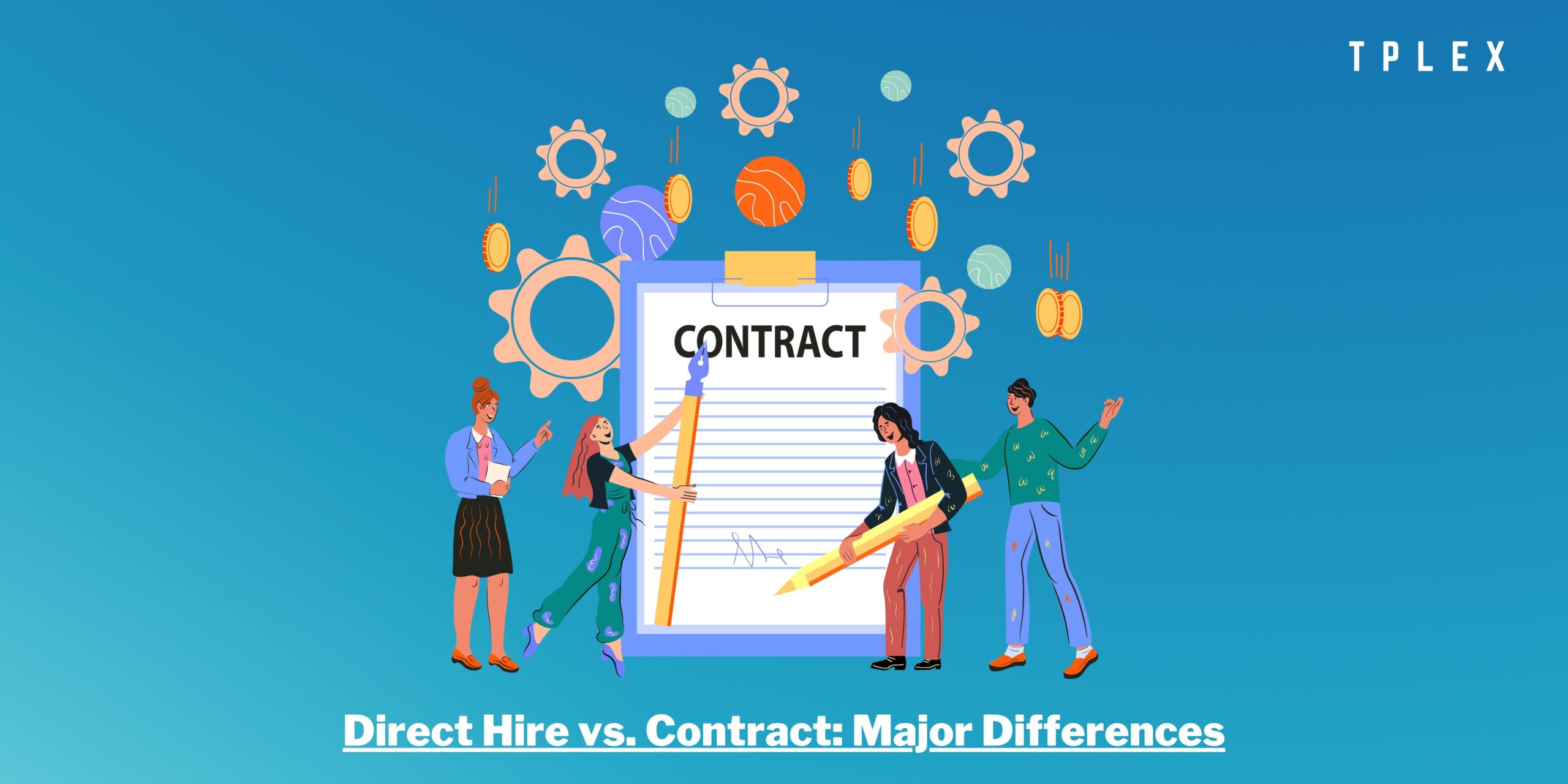Direct Hire Developers vs. Contract: Major Differences in Scaling Your IT Team
In today’s fast-paced and technology-driven business landscape, companies often face a critical decision regarding expanding their IT teams: whether to opt for direct Hire Developers or contract employees.
This decision significantly affects a company’s growth strategy, budgeting, and overall project success.
TPLEX understands businesses’ challenges and aims to provide insights into the key differences between direct hires and contract employees when scaling your IT team.

Direct Hire Developers: Building a Permanent Foundation
Direct hiring involves bringing full-time employees on board to form a permanent part of your team. These employees are integrated into the company culture, benefit from long-term job security, and are expected to contribute to the company’s growth over an extended period.
While direct hiring requires more upfront investment in terms of time, resources, and benefits, it can yield several advantages:
Cultural Integration: Direct hires become integral to the company’s culture. They can align closely with the company’s values, goals, and mission, resulting in a sense of ownership and loyalty.
Long-term Commitment: Direct hires are committed to the company for the long haul. This often translates into deeper engagement and a better understanding of the company’s long-term vision.
Skill Development: With direct hires, companies can invest in skill development and training programs to enhance their employees’ abilities over time. This results in a more specialized and adaptable workforce.
Stability and Consistency: Direct hires stabilize the team, as they are less likely to jump ship for short-term opportunities. This stability can lead to better collaboration and project continuity.
Contract Employees: Flexibility and Expertise on Demand, Contract employees, freelancers, or consultants are hired for specific projects or periods. They bring particular skills and expertise to the table, addressing immediate needs without the long-term commitment of a permanent position. The advantages of hiring contract employees include:
Immediate Expertise: Contract employees are often hired for their specialized skills, which can be crucial for meeting project requirements beyond the current team’s capabilities.
Flexibility: Contract staffing offers flexibility in scaling the team based on project needs. This is particularly beneficial for projects with fluctuating demands.
Cost Efficiency: Hiring contract employees can be cost-effective in the short term, as companies don’t have to bear the long-term financial commitments associated with full-time positions.
Fresh Perspectives: Contract employees bring fresh perspectives and ideas to the team, as they have experience working with various companies and industries.
Choosing the Right Approach for Your Business
The decision to choose between direct hires and contract employees depends on various factors, including the nature of the project, budget constraints, timeline, and the company’s long-term vision. TPLEX recommends considering the following aspects when making your decision:
Project Duration and Scope: If your project has a well-defined scope and a fixed timeline, hiring contract employees might be a more practical choice. On the other hand, if the project is ongoing and requires continuous development, direct hires might provide better stability.
Urgency and Time-to-Market: Contract employees can provide immediate expertise to meet tight deadlines if your project demands rapid development and deployment.
Skill Requirements: Assess whether your existing team possesses the necessary skills to execute the project efficiently. If there’s a skill gap, hiring contract employees with the required expertise can bridge that gap effectively.
Budget Considerations: Evaluate your budget constraints and long-term financial commitments. While direct hires involve higher initial costs, they might prove more cost-effective in the long run if the project requires ongoing maintenance and updates.
Company Culture and Vision: Consider how important cultural alignment and long-term commitment are for your project’s success. Direct hires could be the way to go if your project relies on a closely-knit team with a unified vision.
Risk Tolerance: Assess the risks associated with each approach. Direct hires involve greater commitment but offer the advantage of dedicated team members invested in the company’s growth. Contract employees offer flexibility but may lack the same level of attachment to the company.
You can also explore the LinkedIn page of TPLEX for additional information and updates on their services.
Conclusion
In the dynamic world of software development and IT, choosing between direct Hire Developers and contract employees is not a one-size-fits-all solution.
TPLEX recognizes that every business is unique, and the choice should align with the company’s goals, project requirements, and budget constraints.
While direct hires provide stability, cultural integration, and long-term commitment, contract employees offer immediate expertise, flexibility, and cost-efficiency.
By carefully assessing the needs of your project and considering the factors stated above, you can make an informed decision that paves the way for software development success.
Whatever path you choose, TPLEX is here to support your journey toward scaling your IT team and achieving your business objectives.




